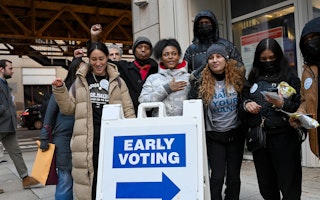The Voting Rights Act 47 Years Later
By Stephanie Ramirez-Burnett
This month marks 47 years since President Lyndon B. Johnson signed the Voting Rights Act of 1965. The legislation was a response to the discriminatory voting practices many African Americans faced in the South after the Civil War. It was celebrated as a sign of changing times: blacks would no longer endure outlandish obstacles such as literacy tests, poll taxes, harassment, and in the most severe cases, physical violence that kept them from engaging in their community. This new law gave them hope, pride, and the chance to engage in democracy. The legislation had a great impact: 60 percent of eligible blacks were registered to vote by 1968. To many Americans – both white and black – the Voting Rights Act was a huge victory.
Fast forward to 2012; the path to civic engagement has new obstacles. Several state governments have enacted a range of laws that suppress voting, and there have been more challenges to the Voting Rights Act since 2011 than the previous 45 years combined. Some states, such as Texas, are subject to Section 5 of the Act, which requires states with a history of voter discrimination to pre-clear any changes of their voting procedures changes with the Justice Department. This past March, the Justice Department blocked a Texas law requiring an ID to vote. The law would create a huge disadvantage to Latino and black voters who on average are less likely to have photo IDs than white voters. Pennsylvania adopted a similar law that would keep 758,000 registered voters from the polls this November for lack of ID cards.
In Florida, a law restricting voter registration drive activity passed in 2011. Advocates of the Florida law claim they wanted to reduce fraud even though there is no evidence to suggest this is an issue. Unfortunately, the law has made voting harder for particular groups: blacks and Latinos. Florida’s law has created such burdens on voter registration drive activity that most groups in the state have discontinued their registration drives. According to the 2004 and 2008 census, black and Latino voters rely more heavily on community-driven voter registration than whites in the state of Florida.
In total, 33 states have passed laws requiring identification for voting. Other laws include Florida and Ohio laws cutting early voting periods. According to an Associated Press report, states with extended voting periods increase voting for Latinos, blacks, new citizens, and low-income people, people who have lower turnout for Election Day and people who also lean left and tend to vote Democrat.
What all of the voter suppression laws have in common is their attempt to take away one of the greatest acts we have to become involved in our communities. As a child I remember Election Day very clearly: waiting for my dad to get home from work so we could ride to our neighborhood library to go vote (my mother did not become a citizen until I was in college). I remember making my way to the children’s voting section and discussing afterward who we voted for and why. I still get the same excitement as an adult on Election Day.
We should be encouraging people to make their voices heard, not keep them quiet. In 2012, it should be easier, not harder, to vote than it was in 1965. People fought and some even died for their right to vote, who knew that 47 years later we would still be fighting.
Learn more about the fight to protect voting rights on the Brennan Center website.
Until August 2015, Stephanie Ramirez-Burnett was a program associate with the Justice Fund of U.S. Programs.


